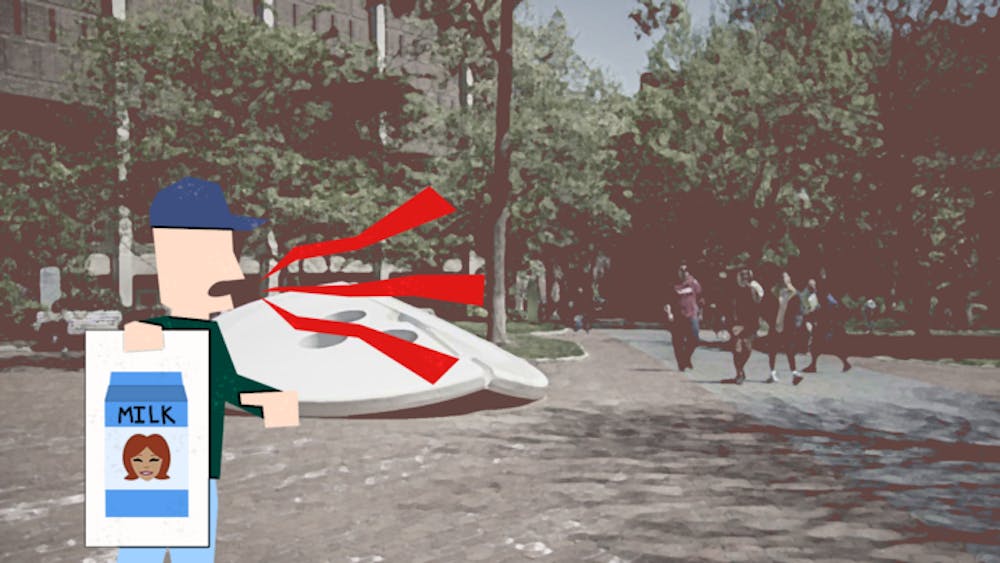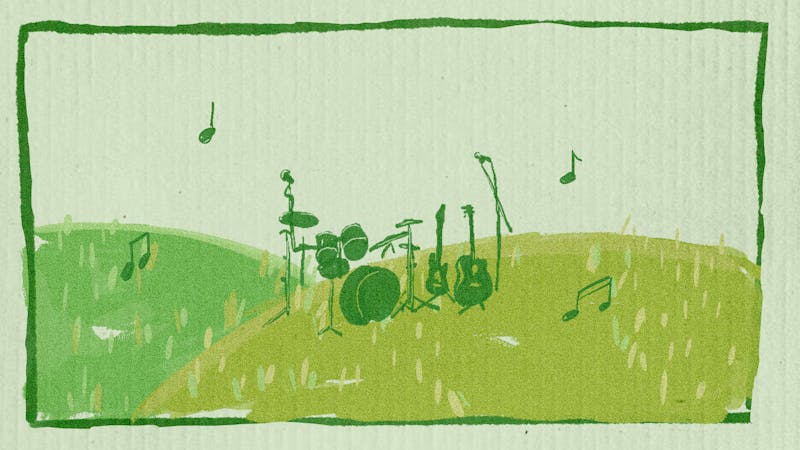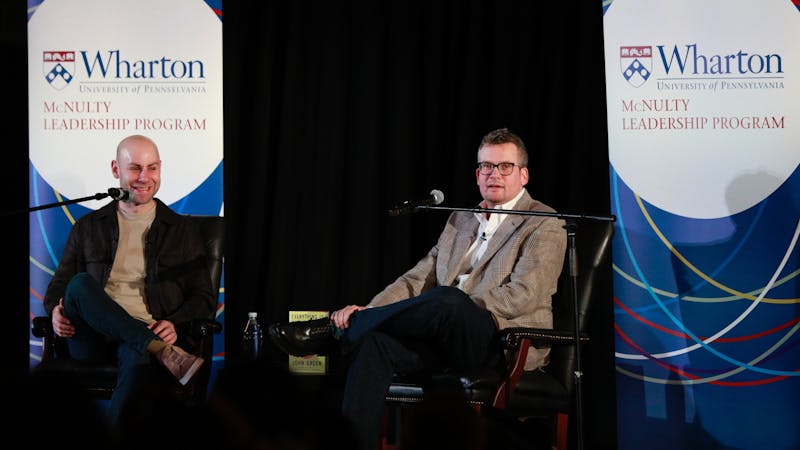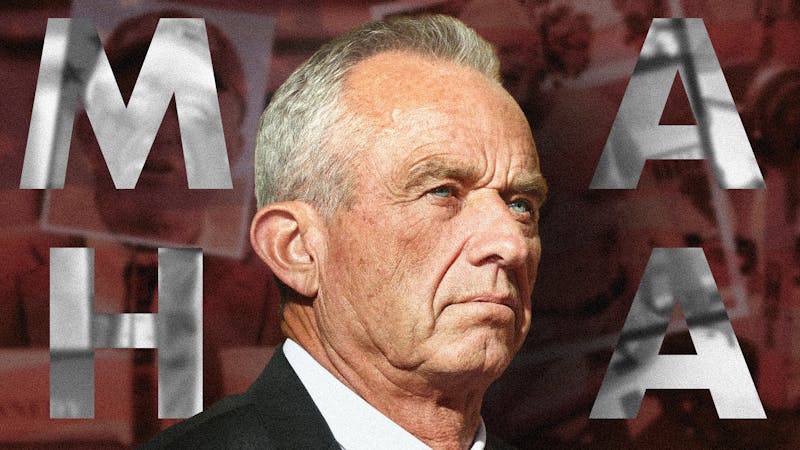Most people lose their taste for breast milk around the age of two. We grow our first set of teeth and begin to experiment with solid food—eventually, there’s no need for breast milk in our diets anymore. But if you head down Locust Walk at just the right time, you might be confronted with a table advertising human breast milk for adults, and maybe even be approached by someone asking if you were interested. You’d soon realize that this isn’t actually a scheme to get you hooked on a strange new nutritional fad: It’s a publicity stunt by the Allied Scholars for Animal Protection, a nonprofit advocating for the morality of veganism.
Founded in 2022 by Faraz Harsini, ASAP aims to create a “unified infrastructure for effective and sustainable animal advocacy at universities,” according to its statement in the Effective Altruism Forum. Effective Altruism, a term coined in 2011 by a group of Oxford philosophers, refers to a movement founded on using empirical data to maximize the effectiveness of charitable giving. At its core is a utilitarian approach to philanthropy: In theory, it tries to achieve the greatest possible good with the least possible money by allocating these funds to the most practical causes.
While their basic principles seem inoffensive, it seems like an issue that EA’s main proponents are billionaires like Elon Musk, and that the causes the movement champions are usually obscure and relatively distant from real issues facing the world today. Rather than putting money into climate research and adaptive technology, the movement seems most worried about building doomsday bunkers. If you’re a Silicon Valley tech billionaire, you might be moved by Effective Altruism to support the cause of long–termism, building colonies on Mars to support the existence of humans generations into the future. If you don’t have that kind of money, however, you could always donate your time to tabling on Locust Walk with signs advertising human milk and dog meat.
If you’re disturbed by the idea of eating man’s best friend, you’re not alone—and that’s kind of the point. You’re initially drawn in by the shock, but if you stick around long enough to listen, you’ll hear a list of justifications full of phrases like “personal choice” and “nutritional benefits.” By the end of the speech, you’ll have it pointed out to you that the pigs you’re so comfortable eating are actually even smarter than dogs.
But how does one actually find themselves behind a table like this? When it comes to their initial journey into veganism, many cite documentaries like Vegucated and Dominion.
“There was a scene with a pig in a slaughterhouse, and I saw the terror in her eyes and I knew I didn’t want to be personally responsible for exploiting another individual as long as I live, so I went vegan right away,” explains Benjamin, a volunteer with ASAP who preferred not to be identified by last name. “I became active several years later, realizing that it’s not enough to just abstain from supporting animal exploitation, I actually have to advocate and help others make the connection that animal exploitation is unjust and unethical.”
Scenes such as these are screened by ASAP often, including in a publicity stunt where activists in Guy Fawkes masks sat outside Van Pelt–Dietrich Library with TVs strapped to their chests. Often filmed with drones or hidden cameras, these films go undercover to expose animal abuse in the meat and dairy industry.
“At first I just didn’t know about what happens in dairy and eggs, which are also industries which lead to a lot of exploitation, abuse and eventual death of animals as a standard part of the process,” says Elaine, a Penn student and member of ASAP. “Fundamentally I think it’s more obvious when you’re eating meat, it’s the body part of an animal, it’s obvious they have to die for that, but there’s other parts of the industry that are just as horrific, in terms of what they’re doing to these animals. It’s less obvious, but it doesn’t mean that behind closed doors it isn’t still happening.”
The idea of advertising human milk comes from UK–based vegan activist Joey Carbstrong, who, in one of his many prank videos on Youtube, sets up a stand and attempts to hand out samples of human breast milk (actually oat milk), assuring passerby it’s ‘fresh–squeezed’ and ‘free range.’ The intent is to point out the hypocrisy of dairy consumers, but many in these videos are disturbed and offended by Carbstrong’s stunts; he’s also come under fire for likening dairy farming to rape.
Though ASAP highlights some information about veganism’s impact on the environment and human health (they shout out Chris Paul, plant–powered NBA point guard!) in their pamphlet, their main selling point is the moral righteousness behind the diet.
“I imagine you don’t steal from other people—do you not do that because it’s bad for the environment, because it’s bad for your cholesterol, or because it’s wrong? … There’s many reasons to adopt a plant based diet, a plant based lifestyle, but veganism is solely, exclusively a moral stance against using animals as objects,” says Benjamin. “People are more likely to stay vegan when they’re motivated by the ethics, and that’s the importance for all vegans to be on the same page when it comes to what veganism is.”
Some vegans on campus, however, take a slightly more inclusive approach to their activism. Outside of 1920 Commons a few weeks ago, diners may have encountered a different sort of table demonstration: the Penn Alt Protein Project offering up a range of different alternative proteins, from seitan to soy milk, and a quiz (with prizes!) about the protein content of each.
“I feel like the main priorities are education, and also access, and just making people aware about the opportunities with plant–based eating,” explains Maya Miller (C’ 27). She’s involved in the Alt Protein Project, but also spent the last two summers advocating for sustainable lunch options in public schools with the Plant Powered Youth Steering Committee. On top of these initiatives, she is currently campaigning with the New Roots Institute for more sustainable and ethical Penn dining halls.
“Industrial agriculture touches so much, food touches so much, so it becomes hard to ignore, once you realize the impact that it is having on the world,” Maya says. “Learning about all of the other issues associated with industrial agriculture, such as public health, social justice, animal welfare, I decided it was within reason for me to go vegan. And it was possible for me; I was able to get food that was both nutritious and healthy. So I’m fortunate for that.”
Access to vegan options is one of the main issues people have with plant–based diets. Veganism, and being choosy about the food you eat in general, is a privilege. Such a diet can be expensive and, for people living in food deserts, simply untenable.
“Vegans in the U.S. are most often embedded in a very secure food system that allows them to pick and choose some of the highest quality and also highly processed foods that have ever been available, and to have as much of it as they want,” explains professor Katherine Moore, undergraduate chair of the Department of Anthropology. “Diets full of agave syrup, nuts, tropical oils, fresh fruits in the winter, etc. demonstrate the skimming off the cream of food production, not eating sustainably …They ignore the economic and environmental costs of some of their favorite foods.”
No matter one’s dietary choices, there are questions and contradictions to be reckoned with. Yes, a single serving of beef produces more than four pounds of CO2, but soybean production also causes significant deforestation and ecological damage. Almonds are a great source of plant–based protein, but they also require an inordinate amount of water and pesticides to be grown. On the flip side, ethical hunting of deer can prevent them from overrunning ecosystems and starving to death—it also plays an important role in the endurance of Indigenous culture in the Americas. Though our dietary options have never been more varied, the consequences of each choice have multiplied as well.
“These are deeply personal choices and not a universal rule to live by. Moral absolutism is a trap in a complicated world and for anyone who wants to experience a wide realm of human relationships and human–animal relationships,” Moore says. “Your ethical choices about the right food might make sense in the small universe of your own body, but the reasoning might produce a different outcome the larger the universe you define for yourself.”
Ultimately, it’s up to each individual to decide what they put in their body to fuel them throughout the day. At the ambitious speed most Penn students live, we don’t have much time to think about the things we eat in between classes and midterms and meetings; it’s easy to fall for the illusion that food simply appears in dining halls for our consumption. While you don’t have to be running to Commons to pile tofu on your plate, you can always make the effort to know a little more about how the things you do pile on your plate came to be there.





